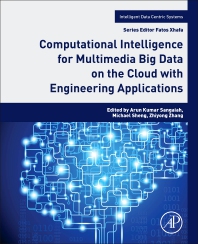Books in Artificial intelligence expert systems and knowledge based systems
Books in Artificial intelligence expert systems and knowledge based systems
- 4th Edition
- July 2, 2022
- Jiawei Han + 2 more
- English
- Paperback9 7 8 0 1 2 8 1 1 7 6 0 6
- eBook9 7 8 0 1 2 8 1 1 7 6 1 3

Data Mining
- 1st Edition
- May 21, 2022
- SK Hafizul Islam + 3 more
- English
- Paperback9 7 8 0 3 2 3 9 0 1 9 3 2
- eBook9 7 8 0 3 2 3 9 0 1 9 4 9

Blockchain Technology for Emerging Applications
- 1st Edition
- July 31, 2021
- Siddhartha Bhattacharyya + 4 more
- English
- Paperback9 7 8 0 1 2 8 2 2 8 4 4 9
- eBook9 7 8 0 3 2 3 8 5 1 7 9 4

Recent Trends in Computational Intelligence Enabled Research
- 1st Edition
- June 13, 2021
- Pardeep Kumar + 3 more
- English
- Paperback9 7 8 0 1 2 8 2 1 7 7 7 1
- eBook9 7 8 0 1 2 8 2 1 7 8 1 8

Machine Learning, Big Data, and IoT for Medical Informatics
- 1st Edition
- April 23, 2021
- Stephanie K. Ashenden
- English
- Paperback9 7 8 0 1 2 8 2 0 0 4 5 2
- eBook9 7 8 0 1 2 8 2 0 4 4 9 8

The Era of Artificial Intelligence, Machine Learning, and Data Science in the Pharmaceutical Industry
- 1st Edition
- February 21, 2019
- William Lawless + 4 more
- English
- Paperback9 7 8 0 1 2 8 1 7 6 3 6 8
- eBook9 7 8 0 1 2 8 1 7 6 3 7 5

Artificial Intelligence for the Internet of Everything
- 1st Edition
- September 14, 2018
- Jordi Conesa + 3 more
- English
- Paperback9 7 8 0 1 2 8 1 3 1 8 9 3
- eBook9 7 8 0 1 2 8 1 3 1 9 0 9

Geographical and Fingerprinting Data for Positioning and Navigation Systems
- 1st Edition
- August 21, 2018
- Arun Kumar Sangaiah + 2 more
- English
- Paperback9 7 8 0 1 2 8 1 3 3 1 4 9
- eBook9 7 8 0 1 2 8 1 3 3 2 7 9

Computational Intelligence for Multimedia Big Data on the Cloud with Engineering Applications
- 1st Edition
- October 25, 2016
- Syed V. Ahamed
- English
- Paperback9 7 8 0 1 2 8 0 5 4 7 8 9
- eBook9 7 8 0 1 2 8 0 9 3 5 5 9

Evolution of Knowledge Science
- 1st Edition
- September 15, 2016
- Siddhartha Bhattacharyya + 2 more
- English
- Paperback9 7 8 0 1 2 8 0 4 4 0 9 4
- eBook9 7 8 0 1 2 8 0 4 4 3 7 7
